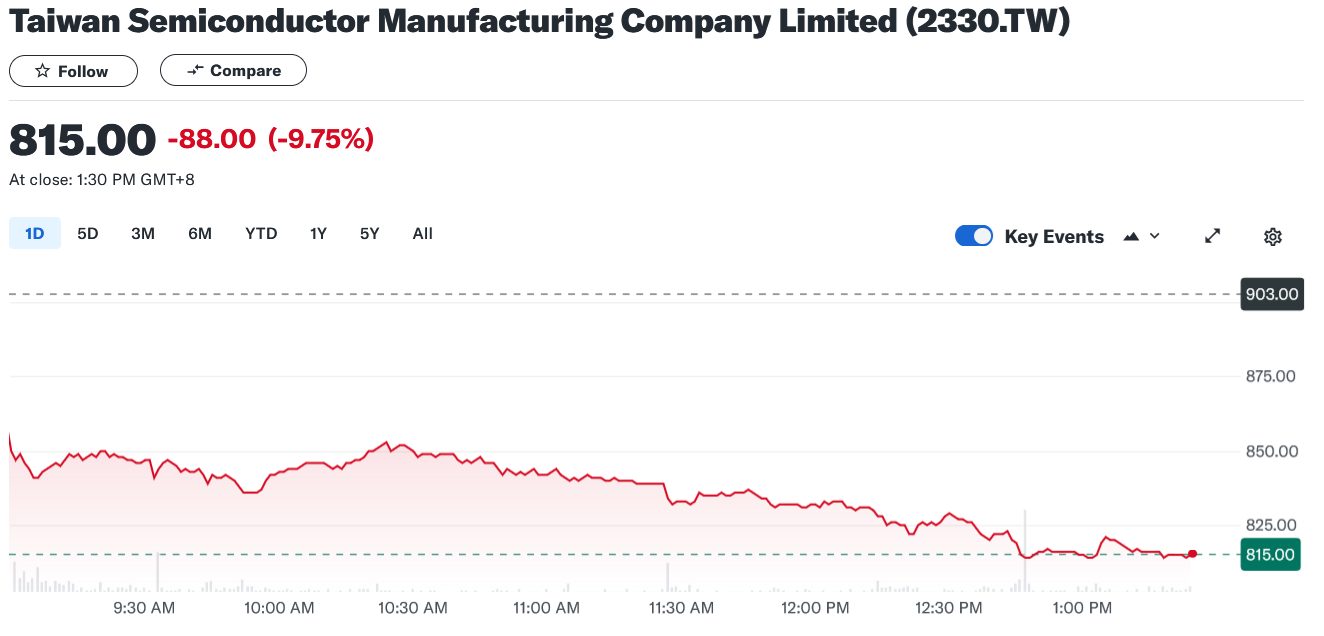Day Trading in Taiwan



Famed for its deep levels of liquidity and high volatility, Taiwan is a popular destination for day trading. Close supervision from the Financial Supervisory Commission (FSC) and the Central Bank of the Republic of China (Taiwan) (CBC) mean investors can trade financial assets with peace of mind.
This guide will explain how day trading in Taiwan works, discussing the country’s stock market, regulatory landscape and tax regime. We’ll also show you what a short-term trade on the Taiwan Stock Exchange (TWSE) might look like.
Quick Introduction
- Taiwanese traders can deal in an array of instruments including stocks, bonds, cryptocurrencies and derivatives like futures and options though CFDs are banned.
- Taiwan’s Financial Supervisory Commission (FSC) is tasked with regulating and supervising the country’s financial markets, while the Central Bank of the Republic of China (Taiwan) (CBC) oversees forex trading and monetary policy.
- Active traders are typically required to pay personal income tax of 5% to 40% on taxable income, as well as a Securities Transaction Tax when they sell assets (apart from government bonds), to the National Taxation Bureau of Taipei (NTBT).
Top 4 Brokers in Taiwan
After evaluating 223 platforms, these 4 brokers are our front runners for active traders in Taiwan:
Day Trading Platforms in Taiwan
What Is Day Trading?
With day trading, individuals aim to capitalize on short-term price fluctuations by buying and selling financial assets, such as Taiwanese stocks, within the same trading day.
Traders establish positions that may last from a few minutes to several hours, seeking price volatility to increase their potential for profit, though this also increases the potential for large losses.
In Taiwan, traders can choose from a wide variety of assets including stocks and cryptocurrencies. Forex trading in Taiwan has also coveted notable interest in recent years. The territory has a large and vibrant day trading community, thanks in large part to its excellent technological infrastructure.
Share trading in the country takes place on two exchanges: the Taiwan Stock Exchange (TWSE), and the Taipei Exchange (TPEx):
- The TWSE is the territory’s primary stock exchange and home to its largest and most established companies.
- The TPEx specializes in helping smaller businesses gain access to capital markets.
Taiwan’s largest-listed companies are quoted on the technology-dominated FTSE TWSE Taiwan 50 Index.Major names here include microchip giant Taiwan Semiconductor Manufacturing Company, electronics maker Hon Hai Precision Industry, and MediaTek, another semiconductor producer.
Is Day Trading Legal In Taiwan?
Yes. Short-term trading is a popular pursuit thanks to the robust oversight of the Financial Supervisory Commission (FSC), the body responsible for maintaining financial stability and promoting market development, and ensuring that investors are adequately safeguarded.
Established in 2004, the FSC describes itself as “the competent authority responsible for development, supervision, regulation, and examination of financial markets and financial service enterprises in Taiwan.”
The Central Bank of the Republic of China (Taiwan) (CBC), meanwhile, is required to ensure the stability of the country’s forex market and monetary policy. The organization says that “[while] the New Taiwan Dollar exchange rate is determined by market forces… when seasonal or irregular factors disrupt the market, the CBC will step in to maintain an orderly foreign exchange market.”
Brokerages should be approved by the FSC’s Securities and Futures Bureau (SFB), the division responsible for regulating and supervising the securities and futures markets. It maintains lists of major and administrative sanctions that are enforced on financial services companies on its website.
How Is Day Trading Taxed In Taiwan?
Full-time day traders typically pay tax on the profits they make. Taiwan’s tax system is administered by the National Taxation Bureau of Taipei (NTBT), a department of the Ministry of Finance.
Income Tax is applied on a progressive scale, ranging from 5% up to 40%. The maximum tax rate of 40% is applied on net taxable income of 4,980,001 and above. More details on tax bands can be found at the NTBT.
Individuals must also pay Securities Transaction Tax of 0.3% when they sell shares in Taiwanese companies.
For all other securities (except government bonds), Securities Transaction Tax is applied at 0.1%.
Getting Started
There are three main steps you need to take to start trading in Taiwan:
- Choose a broker. Competition is fierce in Taiwan’s financial services sector, so traders have a wide range of brokerage options. Key things to look at include dealing costs, the quality of the broker’s platform, and the amount of leverage on offer (if you plan to trade with borrowed funds). And most importantly, you should check the broker is approved to trade by the FSC.
- Open a trading account. Brokers will require personal information including your name, date of birth, address, and employment status, along with proof of identification and residence, which can be provided with Taiwan’s National Identification Card. They may also enquire about your financial situation, and investing style and experience, to assess your suitability for different types of trading, such as high-risk day trading.
- Deposit funds. You won’t be able to begin trading without money in your account. So the final stage is to inject some New Taiwan Dollars into your account. Popular methods include wire transfer, debit card, and transactions through local online payment providers (such as LINE Pay). These may differ from broker to broker.
A Trade In Action
With these steps ticked off, you’ll be ready to begin day trading in Taiwan’s financial markets. Here’s an example of what a short-term share trade on the TWSE could look like.
The Background
In this scenario, I want to make a profit by buying shares in Taiwan Semiconductor Manufacturing Company. I believe the tech giant – which is one of the world’s top three semiconductor suppliers – will rise in value following the Bank of Japan’s next interest rate announcement.
I come to this conclusion after studying recent economic data, reading recent monetary policy statements from the Bank of Japan, and studying economists’ comments. My belief is that Japan’s central bank will cut interest rates by 0.25% at its next meeting. This differs from the broader market, which is pricing in a rate freeze.
This scenario would provide an added boost to consumers’ and companies’ spending power in Japan, and as a consequence likely boost demand for tech products like microchips.
There are many TWSE semiconductor shares I can buy today, but I like Taiwan Semiconductor Manufacturing Company because of its high liquidity. Superior trading volumes can lead to greater volatility, and reduced trading costs thanks to tighter bid and ask spreads.

My next step is to carry out some technical analysis. This gives me a chance to better ascertain where the chipmaker’s share price could be heading by identifying chart patterns and trends.
The Trade
With my research over, I’m ready to place the trade. I open my trading platform at 11:15 Taiwan Standard Time (TST), giving me plenty of time to key in my trade. The Bank of Japan tends to make interest rate announcements from around 11:30 TST.
My bullish trade involves two steps to help me manage risk:
- My ‘take profit’ order automatically closes my position if Taiwan Semiconductor Manufacturing Company shares rise to a pre-selected level, thus locking in any gains I’ve made.
- My ‘stop loss’ instruction minimizes any losses by closing the trade if the tech stock falls to a specified price.
At 11:15, the share is trading at 830 New Taiwan Dollars (TWD) per share, so I elect to place my ‘take profit’ at 834 TWD and my ‘stop loss’ at 826 TWD.
Half an hour later, the Bank of Japan announces it has cut rates by 0.1%. This is lower than I’d expected, but still gives Taiwan’s tech sector cause to rally.
Within a further 45 minutes, Taiwan Semiconductor Manufacturing Company’s share price has hits my ‘take profit’ trigger of 834, closing my trading and giving me a profit of four TWD for each share I bought.
Bottom Line
Exceptional digital infrastructure and a strict regulatory landscape make Taiwan an attractive place for short-term trading.
Individuals still need to be aware that – as in other countries – scammers still operate, so always check that the broker you choose is authorized by the FSC before providing personal details and handing over money.
To get started, turn to DayTrading.com’s choice of the top brokers for day trading in Taiwan.
Recommended Reading
Article Sources
- Taiwan Stock Exchange (TWSE)
- Taipei Exchange (TPEx)
- FTSE TWSE Taiwan 50 Index – FTSE Russell
- Financial Supervisory Commission (FSC)
- Introduction - FSC
- Foreign Exchange - CBC
- Securities and Futures Bureau (SFB)
- National Taxation Bureau of Taipei (NBT)
- Rates Applicable - NBT
- Trading Mechanism Introduction - TWSE
The writing and editorial team at DayTrading.com use credible sources to support their work. These include government agencies, white papers, research institutes, and engagement with industry professionals. Content is written free from bias and is fact-checked where appropriate. Learn more about why you can trust DayTrading.com



